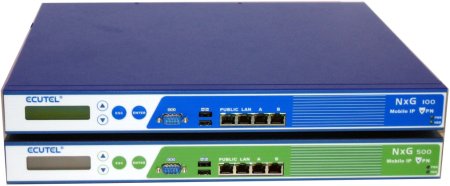Device Profile: Edutel Viatores NxG mobility-enabled VPN servers
Apr 28, 2005 — by LinuxDevices Staff — from the LinuxDevices Archive — 2 viewsEcutel Systems has used Linux to create its first hardware products, a line of VPN servers with a unique “roaming” feature. The NxG Linux Appliances run the company's Viatores Server Software, said to enable mobile users to roam seamlessly between networks, while preserving network security and enterprise application sessions.

Ecutel chose Linux for its first hardware products, even though the Viatores software also runs on Windows
(Click to enlarge)
Ecutel calls its Viatores product a “standards-based IP VPN with a mobility enabler” that enables automated roaming across networks, while maintaining network layer security and application session persistence. The Viatores software includes a server suite that can run on Linux or Windows, as well as an IP Roam Client for Windows and Windows Mobile devices.
Ecutel says Viatores complies with IETF standards and RFCs for IPSec and Mobile IP. It does not require opening a hole in the firewall, and operates at the network layer, supporting existing applications without modification.
Ecutel offers 100- and 500-user versions of the NxG Viatores appliances, respectively called the NxG 100 and NxG 500.
What's under the hood?
Ecutel's Viatores NxG appliances are based on commodity Intel Architecture PC components, housed in a 1U rack-mountable network platform. The NxG 100 uses a P4 processor, while the NxG has a Xeon. They have 512 and 1GB of RAM, respectively.
The NxG appliances currently boot from a 30GB hard drive, although the company is working to adapt the devices to boot from Flash, according to VP of Engineering Andy Zhao.
Both NxG devices include two gigabit Ethernet ports and two 10/100 Ethernet ports, along with two USB ports and a complement of other standard PC I/O.
Software side
The NxG appliances are based on Fedora 2.6, and use the OpenSSL package to provide a secure, encrypted Web interface. The company says it chose Linux for its first hardware products because of the operating system's security, efficiency, low maintenance requirements, and cost. Ecutel implemented Linux itself, without the help of a commercial Linux distributor or support provider, Zhao says.
Zhao says he believes Linux use will continue to grow in the embedded market. “The TCO benefits and the ability to tighten the Linux distribution to support your specific needs assists in mitigation of security threats and maintenance issues. We believe [this] will cause a continued forward trajectory in adoption of embedded Linux products,” Zhao said.
This article was originally published on LinuxDevices.com and has been donated to the open source community by QuinStreet Inc. Please visit LinuxToday.com for up-to-date news and articles about Linux and open source.